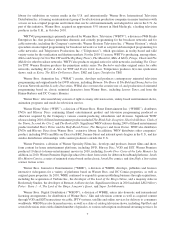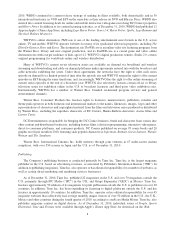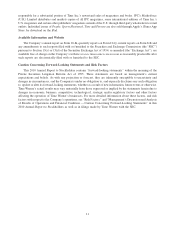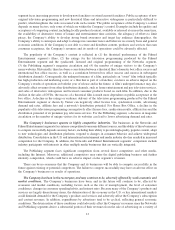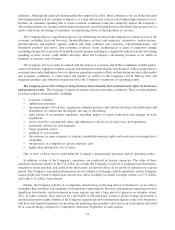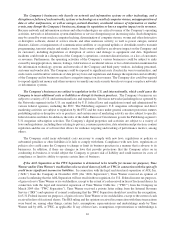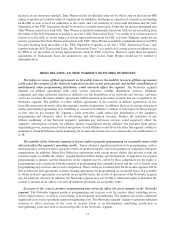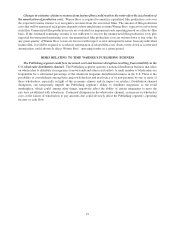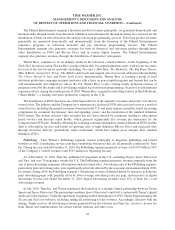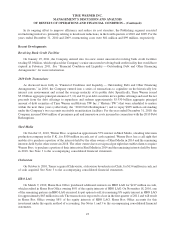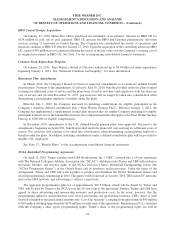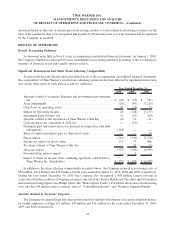Time Magazine 2010 Annual Report Download - page 29
Download and view the complete annual report
Please find page 29 of the 2010 Time Magazine annual report below. You can navigate through the pages in the report by either clicking on the pages listed below, or by using the keyword search tool below to find specific information within the annual report.incorrect or not otherwise satisfied, Time Warner and its stockholders may not be able to rely on the relevant IRS
ruling or opinion and could be subject to significant tax liabilities. Furthermore, opinions of counsel are not binding
on the IRS or state or local tax authorities or the courts, and a tax authority or court could determine that the AOL
Separation or the TWC Separation should be treated as a taxable transaction. Under the tax matters agreement that
Time Warner entered into with AOL, Time Warner is entitled to indemnification from AOL for taxes resulting from
the failure of the AOL Separation to qualify as tax-free (“AOLTransaction Taxes”) as a result of (i) certain actions or
failures to act by AOL or (ii) the failure of certain representations made by AOL to be true. Similarly, under the tax
matters agreement that Time Warner entered into with TWC, Time Warner is entitled to indemnification from TWC
for taxes resulting from the failure of the TWC Separation to qualify as tax-free (“TWC Transaction Taxes” and,
together with the AOL Transaction Taxes, the “Transaction Taxes”) as a result of (i) certain actions or failures to act
by TWC or (ii) the failure of certain representations made by TWC to be true. However, under these tax matters
agreements, if Transaction Taxes are incurred for any other reason, Time Warner would not be entitled to
indemnification.
RISKS RELATING TO TIME WARNER’S NETWORKS BUSINESSES
The failure to renew affiliate agreements on favorable terms or the inability to renew affiliate agreements
could cause the revenues of the Networks segment to decline in any given period, and further consolidation of
multichannel video programming distributors could adversely affect the segment. The Networks segment
depends on affiliate agreements with cable system operators, satellite distribution services, telephone
companies and other customers (known as affiliates) for the distribution of its networks and services, and there
can be no assurance that these affiliate agreements will be renewed in the future on terms that are acceptable to the
Networks segment. The inability to renew affiliate agreements or the renewal of affiliate agreements on less
favorable terms may adversely affect the segment’s results of operations. In addition, the loss of carriage on the most
widely penetrated programming tiers, including as a result of an affiliate’s creation of lower-priced video packages
or tiers that do not include the segment’s cable networks, could reduce the distribution of the segment’s
programming and adversely affect its advertising and subscription revenues. Further, the reduction of any
affiliate marketing of the Network segment’s premium pay television services could negatively affect the
segment’s subscription revenues. In addition, further consolidation among affiliates has provided them greater
negotiating power, and increased vertical integration of such affiliates could adversely affect the segment’s ability to
maintain or obtain distribution and/or marketing for its networks and services on commercially reasonable terms, or
at all.
The inability of the Networks segment to license rights to popular programming on acceptable terms could
adversely affect the segment’s operating results. Turner obtains a significant portion of its programming, such as
motion pictures, television series and sports events, from movie studios, television production companies and sports
organizations. In addition, Home Box Office has agreements with certain movie studios that provide it with the
exclusive rights to exhibit the studios’ original theatrical films during specified periods. Competition for popular
programming is intense, and the businesses in the segment may be outbid by their competitors for the rights to
programming or in connection with the renewal of programming they currently license and the cost to license such
programming may increase due to such competition. There can be no assurance that the Networks segment will be
able to enter into new agreements or renew existing agreements for programming on acceptable terms. If it is unable
to obtain such new agreements or renewals on acceptable terms, the results of operations of the Networks segment
may be adversely affected. In addition, the Networks segment may not be able to obtain the rights to distribute the
content it licenses from others over new distribution platforms on acceptable terms.
Increases in the costs to produce programming may adversely affect the gross margins at the Networks
segment. The Networks segment produces programming and it incurs costs for creative talent, including actors,
writers and producers, as well as costs relating to development and marketing. The segment also incurs additional
significant costs, such as production and newsgathering costs. The Networks segment’s failure to generate sufficient
revenues to offset increases in the costs of creative talent or in development, marketing, production or
newsgathering costs may lead to decreased profits at the Networks segment.
17


